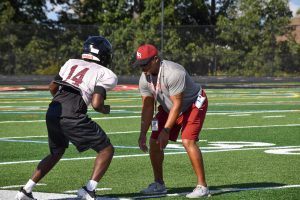How to Prepare For Your Senior Year
13 years of schooling prepares you for your final year of high school when you decide how you’re going to leave the nest. Here are some tips to make the process smoother.
Senior year can be an overwhelming experience if you load up your schedule too much; however, it’s important to remain positive. “[Seniors are] so close to the finish line, it’s literally in sight,” senior Jada Aiken said. “Don’t give up, keep pushing. [Take it] one day at a time.”
February 22, 2022
It’s never too early to start preparing for your senior year. Regardless of whether you want to attend college, take a gap year, or go straight into the workforce, there is a never ending mountain of senior chores to start climbing. Here you’ll find tips specifically geared towards those wanting to pursue a college degree after graduation. Career Center Specialist Mary Barnes will also be holding a college application jump start seminar the first Monday before school starts (Aug. 22, 2022). A sign-up link will be provided in May.
1. Take standardized tests as soon as possible
The dreaded SAT and ACT. Some of us have spent years in prep courses to prepare for this monster of a test, while others have decided to just “wing it.” No matter which path you choose, you need to start early. Luckily, you can take these standardized tests multiple times and only your best score will be reported to colleges. Even if you plan to apply test-optional, it’s still a good idea to take the SAT or ACT. “It just gives you flexibility and where you are today isn’t necessarily what you’re going to be thinking next year [during your senior year],” Career Center Specialist Mary Barnes said. “In addition, some schools, even though they’re test-optional, [have] programs within the school, like nursing or engineering, [that] do require the test.” Barnes added that most students at Rock Ridge prefer the SAT, but colleges will accept either one.
“I decided to take the SAT, because compared to the ACT, it gives you more points for having good reading comprehension skills and that’s always been my strong suit in school,” senior Jada Aiken said. Taking a practice test of each can be helpful to see which fits you best.
2. Compile a list of your colleges
Nothing is more stressful than seeing all of your friends go on and on about their dream school when you have no idea where you want to go. Luckily, there are options to guide you through this process. First, attend a college fair. You can visit this website to find a fair near you or even explore virtual ones. Second, make sure to utilize Naviance. “Naviance has [a Super Match setting] where you put in what your ideal college would look like,” Aiken said. “This was a huge help in figuring out what colleges I’d be interested in, because I’m a pretty indecisive person.” Naviance also has scattergrams that can tell you your chances of getting in based on your statistics and the success of other Rock Ridge students who have applied there. Some other factors to consider when looking are: if the college offers your major, the location and size of the school, if they allow cars on campus, the nearest cities and attractions, diversity ratings, and if it has an LGBTQ+ community.
3. Apply to schools early action for scholarship consideration
Most colleges now consider every applicant eligible for merit scholarship selection if they apply during the early action time period. Sometimes, this may also be the deadline to apply to an honors college.
It is important to know the difference between applying early action and early decision. Early action is applying early within a certain period, so you receive your decision faster and have the chance to earn scholarships. Early decision is a binding contract; therefore, you can only apply to one school ED (ideally your “dream school,”) and if you are accepted there, you must attend that school. According to Barnes, about 70% of Rock Ridge seniors apply to colleges early action.
4. Talk to people
There are no dumb questions and if you are ever confused with anything, it is very likely that many more students in your class are just as lost. Most of your classmates, teachers, and counselors are willing to help you navigate the maze that is the application process. “Teachers are a great source of information, because they tend to know a lot about college and some of their kids have gone through it already,” Aiken said. “Talking about your options with counselors will help you narrow down your choices, learn about paying for college, and choose a higher education path that best fits your goals.” It can also be helpful to talk to older siblings or friends who have already been through the college application process. At the beginning of your senior year, you will need to schedule a mandatory meeting with your counselor to discuss post graduate plans. But, if you have questions before or after this meeting, you can always arrange another time to meet with your counselor.
5. Tour colleges
The best way to find your true college match is going on college tours. “Ideally, it would be great to go visit [colleges] your junior year to get an idea [of the campus and location],” Barnes said. “But then once you’re accepted, it’s really great to go back. More than academics or anything else, it should be about [seeing if you’re a good] fit [for] the school.” Tours are a great way to meet possible future classmates and explore the nearby cities or towns to find out if you can see yourself living there. However, the spots fill up fast, so make sure to book these tours early (preferably a few months in advance), especially if you want to visit in the fall.
6. Apply to scholarships
According to Forbes, “an estimated $100 million in scholarship money still goes unawarded each year, mostly due to a lack of applicants.” You can qualify for merit based scholarships through applying early action, but there are also other ways to save some cash. The easiest for those of us at Rock Ridge is to utilize Barnes’ weekly newsletters that are sent out every Friday to parents and students. At the bottom of the newsletters, there are many links to scholarships arranged in order of submission deadlines. Though most are only for seniors, there are often a handful for juniors, and it’s helpful to know what supplemental materials or criteria you might need to fulfill to apply to them in the future (since most will reoccur the following year). “Most scholarships start becoming available in December of your senior year,” Barnes said. “There’s a few national ones in the fall, but the bulk of them start in December and heat up in January,” Barnes said. Naviance also has a search engine to help you look for scholarships that you may qualify for.
7. Consider earning college credit in high school
The hard truth: college is expensive. A great way to get a jumpstart on your college education and save some serious money along the way is taking Advanced Placement and dual enrollment classes. These courses can translate into college credits if you perform well on AP exams or earn a C or above in your DE classes. If you receive free or reduced lunch, you can talk to your counselor about options for how to pay for AP and DE fees and if you are eligible for a fee waiver. “Even though they can be a real pain sometimes, [AP courses] help give you a head start for college,” Aiken said. “It is so much cheaper to pay $96 for an AP test than to pay thousands for a college class.” However, some schools may not accept DE credits or only accept your AP exam if you got a four or five. You can visit college websites to see their policies on accepting credits earned in high school.
In addition to earning college credits early on, taking these rigorous courses can help your chances during the admissions process. “We offer a lot of rigor here, and when [colleges] evaluate your application, they’re looking at the amount of rigor that we offer versus the amount of rigor that you take,” Barnes said.
8. Start working on your college essay
It’s important to note that you don’t need to survive a helicopter crash or have lived on Mount Everest to get into UVA. However, Barnes’ warns us to stay away from cliches. “Don’t tell them about the ACL tear you had your freshman year, because they see quite a few of those,” Barnes said. “I think any topic can be successful [as long as it’s unique to your personality]. I’ve heard counselors talk about somebody who wrote about making pancakes for their family on a Saturday morning, because their family was important to them. It just needs to be authentic and something that really brings across who you are.” Barnes also advised to start working on your drafts the summer before your senior year, as the prompts will be available by then.
9. Plan your schedule right
To be brutally honest, the first semester of your senior year is really going to suck. You’re going to have a lot on your plate and as Aiken said, “it’s easy to get overwhelmed and feel like you can’t do it.” Despite this, Aiken thinks it’s important to stay positive. However, even with this pressure, you need to keep up the rigor; just keep in mind that you have a lot less free time than what you’re used to. “Try to take [the] rigor that makes sense for you,” Barnes said. “I don’t think you need 14 AP and DE classes. As Harvard says, they don’t want ‘a head on a stick,’ they want someone who’s well-balanced that can balance their activities as well as their academics.”
10. Ask for teacher recommendations at the end of junior year
Your recommendation letters for college should ideally be from teachers you had in your junior year, as they can attest to your most recent abilities and your senior year teachers haven’t really gotten the chance to know you yet. These should also be from core teachers (English, science, history, and math), as some colleges don’t accept them from elective classes. The most important part, though, is that they know you well. “[Pick a teacher] who can attest not only to your academic skills, but your personal strengths and weaknesses,” Aiken said. “That’s what helped me to narrow down who I’d ask.” Aiken was able to build positive connections with her teachers during her sophomore and junior years by talking to them during study hall and office hours. “Teachers take notice when you’re engaged in the class, so put forth the effort,” Aiken said. However, the most important piece of advice is to ask your teachers for recommendations before the end of your junior year. Not only does this give them more time to work on it, but it’s also a sign of respect. Teachers also don’t check their email as frequently during the summer, so the middle to end of June would be the ideal time frame to ask. Finally, don’t forget to thank your awesome teachers for writing your recommendation!


























![The Phoenix varsity volleyball team lines up for the national anthem. “We were more communicative [with each other] during this game, and I feel like we kept our energy up, especially after the first set,” senior Jessica Valdov said.](https://theblazerrhs.com/wp-content/uploads/2024/10/DSC_0202-1200x800.jpg)









![Junior Alex Alkhal pitches the ball. “[I] just let it go and keep practicing so we can focus on our goal for the next game to get better as a team,” Alkhal said.](https://theblazerrhs.com/wp-content/uploads/2025/05/DSC_0013-1-1200x929.jpg)


















![Senior year can be an overwhelming experience if you load up your schedule too much; however, it’s important to remain positive. “[Seniors are] so close to the finish line, it’s literally in sight,” senior Jada Aiken said. “Don’t give up, keep pushing. [Take it] one day at a time.”](https://theblazerrhs.com/wp-content/uploads/2022/02/Senior-Article-Graphic-1-900x900.png)





